The European Defence Agency has been reflecting on the role of the military in environmental sustainability. At a conference scheduled to coincide with the EU’s Sustainable Energy Week, high level speakers made a powerful call for the military to shoulder its responsibilities in this domain – and technical experts plotted ways to do so.
Day 1 of the conference focused on the politics of military sustainability. In a series of panel discussions, speakers reflected on the military’s role in green action, from reducing emissions to improving recyclability. Big questions were asked: where is energy and environmental policy going? What will be the impact of those policies on defence and crisis management? What has been achieved so far? And how can the military and defence world comply with current policy, while enhancing its capabilities?
The overall message that emerged was one of tempered hope. There was a clear consensus that the military has a role to play in this field, a role which goes beyond merely complying with legal obligations – though that in itself is a challenge to be tackled. Mr Jose Maria Figueres, the former President of Costa Rica, and now President of the Carbon War Room, addressed the conference on a videolink from Rio de Janeiro. Speaking with passion and detail, he reminded attendees of the big picture; the imperative incumbent on all of us to move to a low-carbon economy.
Building on that message, the UK MoD’s Alexis Hammer led the way in proposing solutions, explaining the importance of framing action as producing concrete benefits in lives and money saved, rather than abstract common goods. Numerous speakers concurred, proffering statistics that included that every penny increase in the cost of fuel impoverishes the UK MoD by £13 million a year, while US convoys took one casualty for every 24 convoys they operated in Iraq.
This consensus opened the way for a focused debate on the solutions available. David Muchow of Power Anywhere said of the technology for reducing fuel consumption: “It’s real, it’s here now”, and that was on display in the exhibitions by representatives from industry. Though all showed off innovative products, Belgian company ContenO, which produces mobile water purification & packaging systems, was singled out for a special award for their novel and promising offering.
On Day 2, then, technical experts debated how to fulfill the military’s sustainability obligations. Drawing on a number of technical papers, they considered three major areas: systems and architecture; responsible management of munitions and hazardous substances; and improving efficiency and reducing consumption. Paul Johnson recounted his experience in constructing the experimental Power Forward Operating Base to test power-generation technologies, while the EDA’s Tarja Jaakkola offered a European perspective on complying with the Commission’s REACH directive in defence.
Jean Perrot, representing EADS France, offered three principles that might summarize the conference. With long timescales, costly equipment and lives on the line, any military sustainability initiative must march to the beat of three words: anticipation, transparency and communication. In the coming months, the European Defence Agency will move forward with its Military Green initiative, helping build consensus and standards among European militaries in support of sustainability. As it does so, it will bear these precepts in mind.

